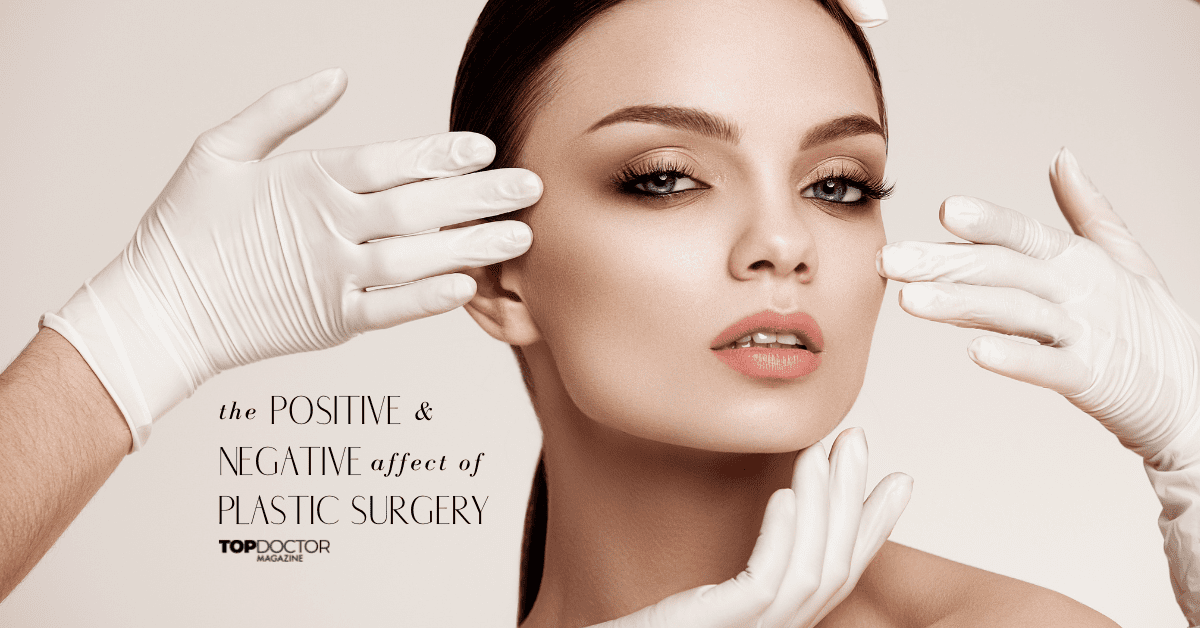Plastic surgery has experienced an explosion in popularity over the past two decades. Some researchers attribute the increase in demand for plastic surgery in the 2000s to the proliferation and popularity of plastic surgery reality TV shows. In comparison, the increase in the 2010s is partly ascribed to the influence of social media.
According to a Precedence Research report, the American cosmetic surgery industry will be worth $205.1 billion by 2030, growing at a compounded annual growth rate of 12.42% between 2022-2030. The American Society of Plastic Surgeons’ 2020 statistics report 15.6 million cosmetic procedures in the U.S. alone.
With plastic surgery occupying such a prominent role in the 21st century, it begs the question: does plastic surgery have a net positive impact on society? Supporters affirm that plastic surgery can improve one’s self-image and boost self-esteem. In contrast, detractors argue that plastic surgery contributes to the root of body image issues and bears unnecessary risks.
To objectively and reasonably conclude the costs and benefits of plastic surgery, we must thoroughly analyze the arguments of both sides of the aisle.
What Are the Benefits of Plastic Surgery?
The primary reason for someone to seek plastic surgery is to alter their appearance, therefore feeling more comfortable and confident in their skin. In theory, a successful cosmetic procedure causes increased self-esteem and self-confidence.
Plastic Surgery Benefits Vary Across Population Segments
A review of 37 studies on the psychosocial outcomes of plastic surgery published in the Plastic and Reconstructive Surgery Journal found that most patients were satisfied with the results of their procedures.
The review notes, however, that patients should be screened for their suitability for these types of procedures and that certain groups are more prone to adverse psychosocial outcomes than others. For example, individuals afflicted by body dysmorphia (a condition whereby one obsessively focuses on a perceived physical flaw) and other mental health issues, such as anxiety and depression, had an increased chance of a negative outcome. Moreover, males going for surgery to resolve relationship issues and those with a history of unsatisfactory plastic surgeries were also at an increased risk for poor psychosocial outcomes.
Plastic Surgery Benefits Are Broad
A substantial amount of research attests to the positive outcomes of plastic surgery. A study published in the Clinical Psychological Science journal compared 554 patients who underwent plastic surgery against a control group of 264 individuals who were interested in these procedures but decided against going under the knife. The group that underwent surgery experienced numerous positive outcomes, including self-esteem, overall well-being, mental health, physical health, anxiety, depression and social phobia.
A two-year study of 360 women who had gone for breast augmentation found that 75-85% of the participants felt that the benefits of their surgeries outweighed the costs and associated risks.
While plastic surgery benefits seem vast and accessible to most, certain population groups need to be cautious before undergoing plastic surgery. The best starting point is to consult a medical professional to determine if you can and, if so, how to avoid adverse plastic surgery effects.
What Are The Negative Effects of Plastic Surgery?
People predisposed to mental health concerns, such as anxiety, depression and personality disorders, can be at an increased risk of experiencing a negative outcome from cosmetic procedures.
The Negative Effects of Plastic Surgery Can Impact Mental Health
A Danish study of 2,761 women who underwent breast surgery found that they were at a notably greater risk of suicide and admission into a psychiatric institution. The study also concluded that these women were more likely to pass away from breast cancer and lung disease.
Furthering these findings, a review of studies of women following cosmetic breast augmentation found that the suicide rate among women who have undergone these procedures is between two and three times higher than the average population.
Some scholars have suggested that plastic surgeons must use new and improved screening methods before agreeing to take on a patient for cosmetic procedures.
The Negative Effects of Plastic Surgery Can Impact Physical Health
Invasive cosmetic procedures are no different from other surgeries risk-wise. Some of the most common complications of plastic surgery include scarring, damaged nerves, the occurrence of a seroma (fluid build-up under the skin), infection and adverse reactions to anesthesia. Even minimally invasive cosmetic procedures can result in complications, such as facial paralysis from BOTOX, inflammation and scarring.
The reported complication rate of plastic surgery varies considerably across sources and according to the type of procedure performed. A review published in the Journal of Cutaneous and Aesthetic Surgery notes that the complication rate can exceed 40% for some treatments.
Contrastingly, the American Society of Plastic Surgeons reported that across 26,302 procedures performed by board-certified plastic surgeons between 1995-2017, the complication rate within a 48-hour period was less than 1%. Meanwhile, a review of 108,303 plastic surgery patients between 2012-2016 found that 5.78% experienced at least one postoperative complication.
There Are Ways to Mitigate The Risks of Plastic Surgery’s Negative Effects
People considering cosmetic surgery can take tangible steps to significantly reduce their risk of complications. Due to the extensive testing and training involved, using a board-certified plastic surgeon can increase the safety of one’s cosmetic procedure. In addition, opting to go for plastic surgery in a single-specialty setting, such as a plastic surgery outpatient center, reduces the risk of surgical site infection compared to procedures performed in a multi-specialty center (e.g., a hospital).
Can You Be Body Positive and Get Plastic Surgery?
Body positivity is intrinsically linked to body image, which describes an individual’s subjective view of their physical appearance. Body positivity is the idea that anyone deserves a positive and encouraging body image regardless of their physical characteristics.
Contrary to popular belief, being body positive and seeking out plastic surgery are not mutually exclusive. Undergoing cosmetic procedures does not nullify the idea that everyone is entitled to view themselves positively regarding their body image.
Unfairly expecting an individual to accept aspects of themselves that they could change and consequently make themselves feel more comfortable in their skin — the essence of body image acceptance — goes against the premise of body positivity. An individual who goes for plastic surgery is not inherently opposed to accepting diverse body types, skin tones and other physical characteristics.
Balancing Plastic Surgery Pros and Cons
The benefits and risks of plastic surgery are often distinct. Deciding whether the gains of the former outweigh the costs of the latter requires a careful examination of one’s circumstances.
You can make a sound decision by taking the time to research how a given procedure may affect your overall health and provide you with a range of benefits.






0 Comments